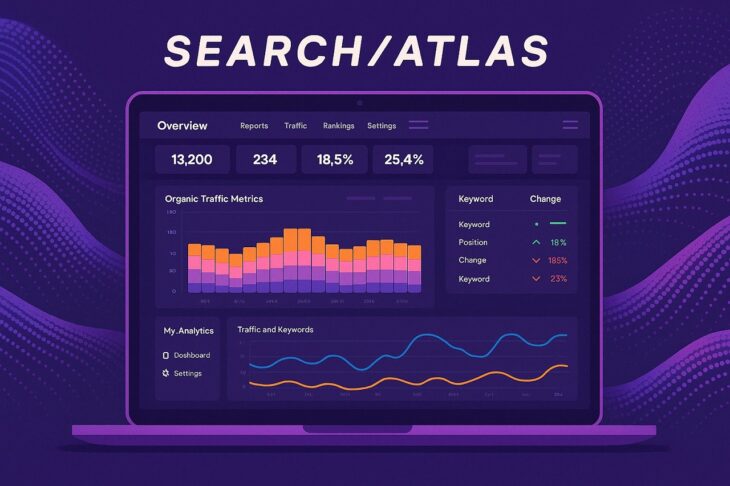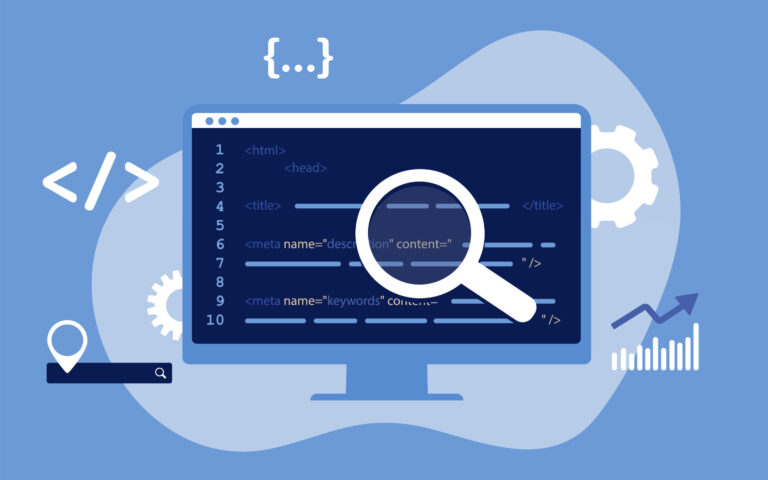AI took center stage in SEO, reshaping how freelancers, marketers, and businesses boost visibility online.
Evolving algorithms and shifting user behaviors demand tools that offer intelligent automation and accurate insights.
SearchAtlas has started turning heads with its streamlined, all-in-one SEO solution that merges power with simplicity.
Its emphasis on AI-driven suggestions and real-time competitor insights makes it a practical choice for those moving away from traditional, data-heavy platforms.
Let us talk about it in greater detail.
Table of Contents
ToggleWhy Do You Need SearchAtlas?
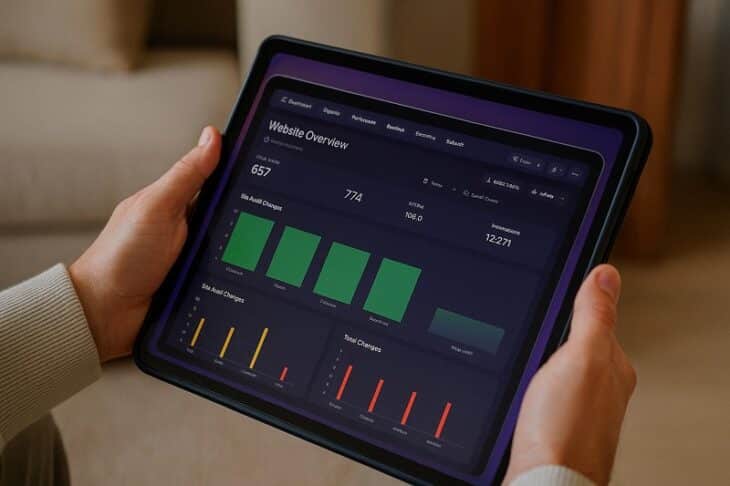
SearchAtlas serves as a strategic SEO companion for professionals who need efficient, actionable, and affordable solutions for digital growth.
With search algorithms evolving constantly, managing SEO manually or with scattered tools becomes both time-consuming and error-prone.
SearchAtlas steps in to eliminate that friction by automating core processes and providing reliable guidance throughout the optimization pipeline.
Built with freelancers, marketers, and small to mid-sized businesses in mind, the platform aims to bridge the gap between usability and effectiveness.
Instead of juggling multiple tools or paying premium rates for enterprise-level software, users can streamline their workflow under one roof.
The structure and tools are engineered for users who value results, not noise.
Key reasons to use SearchAtlas include the following:
- All-in-one structure: Consolidates essential SEO functions into one dashboard, saving time and reducing tool fatigue.
- Keyword research: AI-generated keyword suggestions based on search intent and competitive analysis.
- Content optimization: On-page SEO tools powered by NLP to refine structure, readability, and alignment with search expectations.
- Competitor tracking: Monitors changes in competitor strategies, SERP shifts, and feature appearances like snippets or maps.
- Backlink analysis: Displays both internal and competitor backlinks with actionable insights for strategic link-building.
- Cost efficiency: Designed for professionals who need robust features without paying inflated rates charged by some industry leaders.
SearchAtlas supports those who want control over their SEO results without drowning in complexity. If you want to check it out yourself, click here.
Key Features & Functionality
- AI-enhanced SEO recommendations streamline workflows
- Interface remains clean and user-friendly
- Offers strong value for cost-conscious users
- Combines multiple features into a single dashboard
- Lacks built-in automation for backlink outreach
- Data refresh cycles lag behind premium competitors
- Content tips occasionally hinder creative expression
SearchAtlas aims to be more than just another SEO tool, it provides a consolidated platform designed to manage core optimization tasks with ease.
At its core, the software delivers value by enhancing research, improving content, tracking competitors, and evaluating backlink opportunities.
Every module is infused with AI elements, making tasks not only faster but also smarter.
Keyword Research
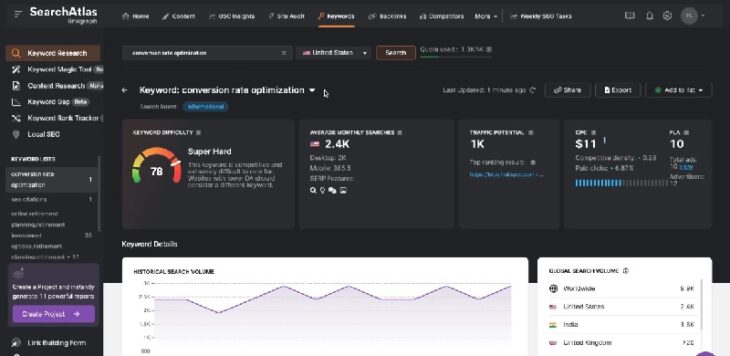
Keyword research in SearchAtlas combines real-time data and machine learning to uncover terms with both search volume and strategic value.
The platform recognizes different layers of user behavior and adapts its recommendations to suit specific goals.
AI helps categorize keywords by:
- Search intent: Recognizes transactional, informational, and navigational behavior
- Competition level: Evaluates SERP difficulty using top-ranking signals
- Suggested terms: Presents long-tail and LSI (Latent Semantic Indexing) keywords
Users can quickly identify which phrases offer the most promise in terms of ranking potential and engagement.
The downside lies in its lack of robust filters, while the interface suits most, advanced users needing extreme customization may feel limited.
Content Optimization
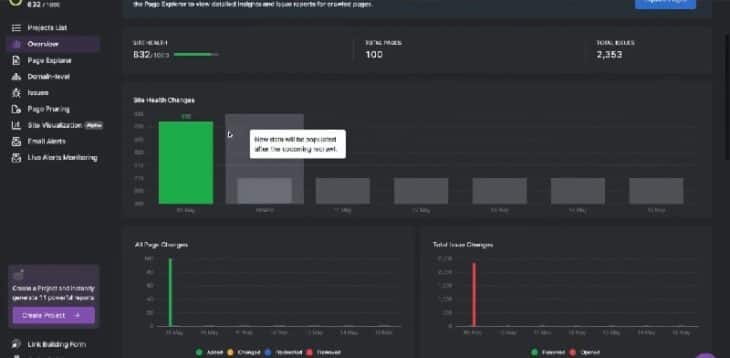
SearchAtlas puts on-page optimization front and center with a system tailored to both structure and semantics.
Natural Language Processing (NLP) drives suggestions, allowing writers to align content with what search engines prioritize without extensive manual auditing.
Tools provided in this module include:
- NLP keyword recommendations: Inserted based on frequency and placement logic
- Readability scoring: Evaluates sentence structure, grammar, and overall clarity
- SEO health indicators: Flags missing headers, meta tags, and internal links
Writers benefit from fast feedback loops that catch issues early. However, content suggestions can feel restrictive.
Strict adherence to machine-driven advice may lead to generic tone or repetition, reducing the creativity some industries require.
Competitor Analysis
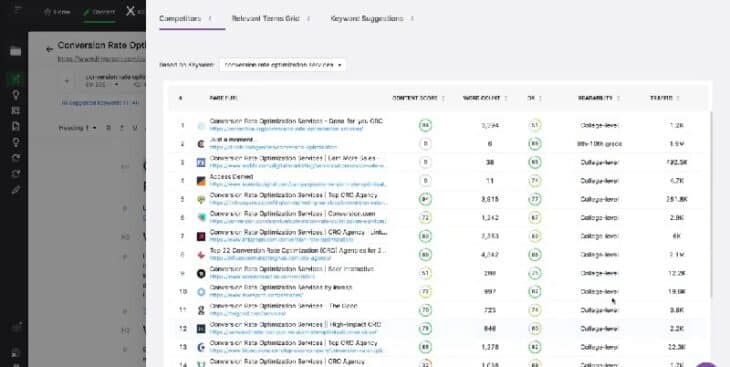
Competitor tracking within SearchAtlas is dynamic and real-time, enabling users to stay informed on what rival websites are doing across search engines.
It supports market awareness by surfacing emerging trends and strategy shifts.
Insights available through competitor tools:
- Shared keyword tracking: Identifies overlaps and content gaps
- SERP feature monitoring: Highlights presence in featured snippets, FAQs, carousels
- Ranking volatility reports: Tracks how competitors climb or fall over time
Users in highly saturated industries benefit most, as SearchAtlas excels in detecting movements within large keyword clusters.
However, niche markets may experience limitations due to smaller data pools and slower coverage updates.
Backlink Analysis & Link Building
Backlink insights are a core component of SEO success, and SearchAtlas approaches this with dual functionality—focusing on both user domains and competitor strategies.
Historical backlink data helps uncover what has worked in the past, while forward-facing suggestions aim to improve future authority.
Features that stand out include:
- Internal and external link audits: Broken links, anchor diversity, domain authority
- Competitor backlink maps: Visualizes how others earned links and from where
- Suggested link-building targets: Based on relevance, authority, and reach potential
SearchAtlas does not yet offer automated outreach or CRM-style management for link-building campaigns.
Those needing full-cycle backlink solutions must rely on other software or manual workflows.
User Interface & Experience
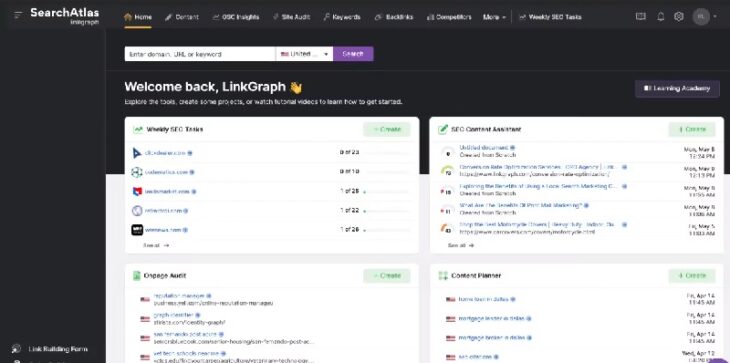
Ease of use can determine how frequently an SEO tool becomes part of a daily workflow. SearchAtlas succeeds by offering a clean, accessible experience that caters to users at all skill levels.
Rather than overwhelming users with cluttered dashboards or feature overload, the platform keeps functionality straightforward and task-focused.
Entry-level users can jump in quickly, while experienced professionals can streamline their processes without navigating through excessive menus or irrelevant settings.
Navigation is logically structured, guiding users through keyword research, content editing, backlink management, and competitor analysis without confusion.
Button placement, labeling, and visual hierarchy all contribute to a fast learning curve.
Frequent actions like switching between projects or exporting reports require minimal clicks.
Compared to platforms like SEMrush and Ahrefs, SearchAtlas provides an experience that feels less overwhelming and more inviting, especially for users juggling tight schedules.
To highlight the strengths of its interface, consider these design and experience benefits:
- Dashboard avoids unnecessary visual noise, focusing only on actionable data.
- Modules are segmented with clear labels and iconography.
- Works fluidly across devices, including tablets and smaller screens.
- Integrated guidance reduces dependency on help articles or support tickets.
- Important metrics are visually distinct, helping users prioritize tasks quickly.
- Users can filter or rearrange project elements to suit their workflows.
Learning curve remains relatively short due to this simplicity.
SEO beginners find themselves acclimated within a single session, while experienced professionals may appreciate how much quicker they can complete routine tasks.
How It Compares to SEMrush & Ahrefs
Comparing SearchAtlas with SEMrush and Ahrefs highlights differences in scope, depth, and usability.
Those looking for enterprise-level analysis and massive historical datasets may lean toward SEMrush or Ahrefs, while SearchAtlas provides a focused toolset that resonates more with freelancers, small teams, and marketers looking to streamline processes without paying for extra bells and whistles.
SearchAtlas vs. SEMrush
SEMrush is a heavyweight when it comes to marketing integrations and historical keyword data.
It excels at serving larger enterprises that require deep research tools, advanced PPC modules, and wide-scale competitor insights.
In contrast, SearchAtlas focuses on what matters most for efficient SEO work, without bloated features that often go unused by smaller teams.
- SEMrush offers comprehensive keyword tracking and trend data going back several years
- Content marketing toolkit in SEMrush provides templates and topic recommendations
- Technical SEO audits in SEMrush are exhaustive but require experience to interpret
- SearchAtlas simplifies keyword research and delivers AI-generated content suggestions without the overload
SearchAtlas vs. Ahrefs
Ahrefs is synonymous with backlink mastery. Its crawler is second only to Google’s in terms of scope, giving users unparalleled insights into link profiles.
Ahrefs also provides robust audit tools for identifying crawl issues, JavaScript rendering errors, and overall site health metrics.
SearchAtlas, while not as technically dense, offers a smoother entry point for users less familiar with these diagnostics.
- Ahrefs dominates in backlink analysis with detailed linking domains, lost links, and anchor distribution
- Technical audit tools in Ahrefs uncover problems that go unnoticed by lighter platforms
- SearchAtlas supports internal and external backlink data with actionable link-building ideas
- Interface in SearchAtlas is far easier for non-technical users to navigate
Ideal User Personas
SearchAtlas aligns well with users who need reliable, cost-effective tools that don’t require advanced technical skill.
It caters to a wide range of users who are results-driven and prefer an intuitive layout over complex systems. User types best suited for SearchAtlas include:
Freelancers: Ideal for those managing several clients with minimal support staff. They benefit from:
- Clean, report-ready insights
- Quick keyword research tools
- Easy-to-interpret optimization advice
Budget-Conscious Marketers: Small marketing teams or individual specialists often find SearchAtlas provides enough functionality without inflating software expenses. Highlights include:
- Competitive monthly pricing
- Feature-packed dashboard for SEO, content, and backlinks
- No need for additional subscriptions to cover basic tasks
Mid-Sized SEO Teams: These teams often work across departments or clients and need flexibility. SearchAtlas supports them through:
- Integrated workflows across keyword research, optimization, and backlink tracking
- Shared access for team collaboration
- Performance metrics tailored for campaign reporting
The Verdict
SearchAtlas delivers solid value for the users it targets. Those needing streamlined SEO insights, backed by artificial intelligence, will find it useful for daily workflows and ongoing campaigns.
For basic to intermediate SEO tasks, it holds its own.
However, professionals dealing with large-scale outreach or highly technical needs may need to supplement it or look elsewhere.
For most marketers and SEO freelancers in 2025, it offers more than enough functionality to stay competitive.
